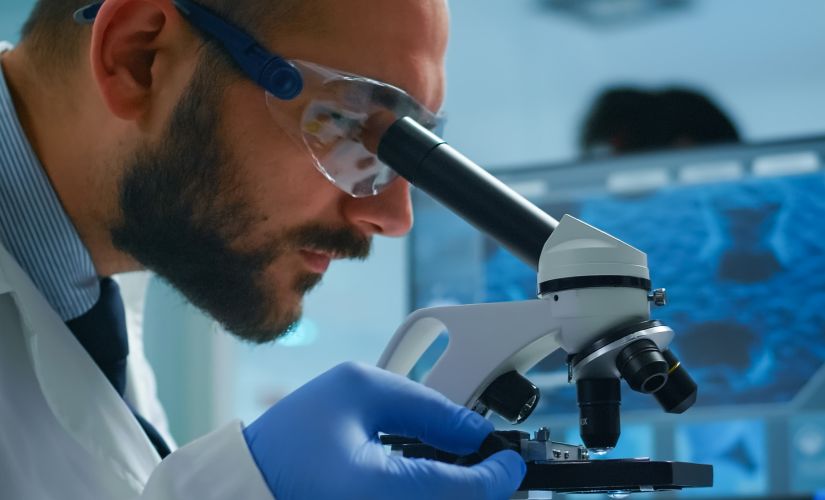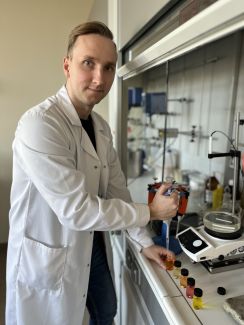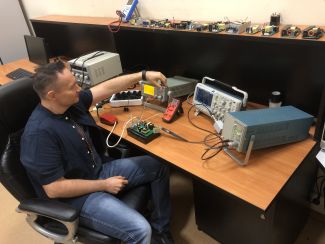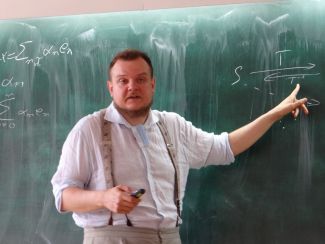Participants in the 6th edition of the MINIATURA competition could obtain funding of between 5,000 to 50,000 PLN for preliminary or pilot research, or scientific internships.
Dr inż. Bolesław Szadkowski from the Institute of Polymer and Dye Technology at the Faculty of Chemistry obtained almost 50,000 PLN for his pilot research: Design and analysis of the physicochemical properties of eco-friendly dying agents with defined functional features.
The project involves developing innovative functional dying agents based on natural raw materials. Basic research planned as part of the grant is not only going to contribute to better understanding of formation and operation mechanisms of functional dying agents based on natural dyes and biopolymers, but will also make it possible to define guidelines to design new eco-friendly pH indicators having antibacterial properties and increased chemical or thermal stability. In the future, it will be possible to use functional color systems designed in this way as innovative pH indicators or antibacterial dying agents for textiles, paints and polymer composites – dr Szadkowski explains the aim of his research.
Dr inż. Rafał Kasikowski from the Institute of Electronics at the Faculty of Electrical, Electronic, Computer and Control Engineering obtained over 42,000 PLN for preliminary research on the effect of the magnetic flux dissipation phenomenon at an air gap on the efficiency and thermal and magnetic parameters of inductive elements in the power factor correction module of high-frequency boost converters.
My task is to design and construct a high-frequency boost converter of the PFC+LLC type. The PFC (Power Factor Correction) module can be configured to operate in discontinuous current mode, at so-called quasi-resonance, in continuous current mode at constant frequency, or in mixed modes to optimize the performance of the PFC module. All modes of operation require designing a choke with an air gap, having appropriate parameters. Dr. Kasikowski says the following about the innovative application of his research: high-frequency pulse inverters have a very wide range of applications, from audio-video devices and information technology, to LED lighting, vending machines, household appliances, medical devices and laboratory equipment, or, with the right design, devices operating at elevated ambient temperature and in hazardous environments. The PFC-LLC type of combination ensures achieving very high efficiency (95% - 97%) of the inverter as a whole, while meeting the condition of a high power factor and relatively low electromagnetic interference emissions.
Almost 34,000 PLN has been granted to dr. Jarosław Swaczyna from the Institute of Mathematics at the Faculty of Technical Physics, Computer Science and Applied Mathematics for a scientific internship with Professor Krzysztof Ciesielski from West Virginia University, toconduct research on dynamic systems with a vanishing derivative. Dr Swaczyna explains: During my internship, I will study the rather paradoxical behavior of dynamical systems defined on the Cantor set, where, in the absence of consistency, even satisfying strong local constriction conditions does not entail pulling the whole system down to a point – unlike in the case of systems defined on an interval. I will be particularly interested in additional properties that the set on which such a dynamical system is defined may have.
In this edition of MINIATURY, young researchers have obtained funding of over 7.7 million PLN. The aim of the competition is to support scientific activities leading to the preparation of the assumptions of a research project to be submitted for competitions organized by the Polish National Science Center or other national and international competitions.




